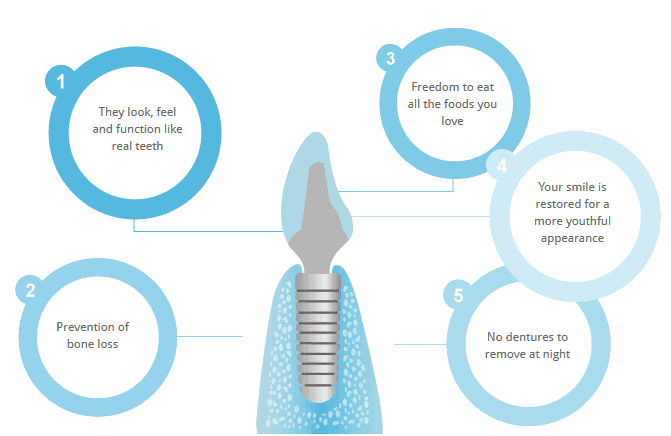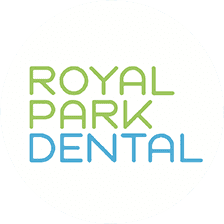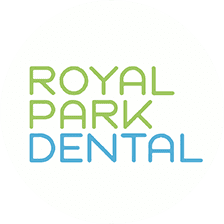Dental Implants Adelaide
What are Dental Implants?
A dental implant refers to the solution of replacing missing teeth or teeth that could not be saved and needed to be pulled out. A titanium screw placed into the jaw bone (all under local anaesthetic so there is no pain) serves as the root of the tooth to support a crown, a bridge or a denture. Once the screw integrates with the jaw bone (takes about 3-6 months, variable between cases), then crown or bridge or denture can be attached to the implant and normal function will be restored with long term benefits.


What are the Benefits of Dental Implants?
Missing teeth will affect people in different ways. Some are more concerned with appearance and some more with function (find it difficult to chew food). Missing teeth will cause adjacent teeth to tip into the open space and the opposite tooth to unnaturally grow into the space. Tipping teeth are difficult to clean, therefore they are more prone to gum and jaw bone disease. When they tip severely or unnaturally grow into the missing teeth’s space, the lack of bone support will increase the risk of losing more teeth.
Whether a person has lost all their teeth, a few of them, or even just one tooth, dental implants are considered as a superior option for lasting chewing and appearance results. In summary, here are some benefits of dental implants:
- Maintain the integrity of bone structure after tooth loss
- Preserve the health of adjacent teeth, since there is no need for bridgework
- Replace loose-fitting dentures
- Distribute bite forces evenly throughout the mouth
- Function and feel like natural teeth
- Improve speaking ability when bulky dentures are eliminated
- Improve facial appearance by preventing bone loss

Which Dental Implant System Do We Use?
We’re the proud delivery partner of MIS, a leading and forefront system in implant dentistry. With its cutting edge facilities, MIS offers a complete range of premium quality dental implants, superstructures, tools and kits, regenerative solutions and digital dentistry. Standing behind MIS are world-class scientists and engineers, devoted to the continued research and development of innovative products and technologies, perfectly matched to the needs of dental implant professionals worldwide.

Dental Implant Procedure
Planning stage
Planning is the most important part of the process. A carefully and intelligently thought-out treatment plan is the difference between success and failure. This will involve dental examination, photos, study models, and 3D scan.
Implant placement
A surgical procedure is required (using local anaesthetic and sedative) in which precision channels are created in the jawbone, often using a surgical guide. The implants are then fitted into the sites so that they are in contact with the bone. They generally require two to six months to fuse to the bone before they can have tooth restorations attached to them to complete the process.
Healing
The bone around the dental implant will grow and integrate with the new implant in a matter of a few weeks.
Temporary restoration
If the dental implant is in a readily visible area, a temporary restoration may be placed for aesthetic purposes while the site heals.
Abutment placement
When healing is complete, the dental implant abutment is placed to connect the dental implant to the porcelain crown.
Porcelain crown
Once our ceramist fabricates the new porcelain crown to exact specifications, we bond the crown to the abutment.
Post Op Care after Dental Implant Treatment
- You may experience some discomfort after the implant placement.
- Take all medication that was prescribed for you according to instructions.
- Apply an ice bag on your face over the surgical site on the day of surgery for 10 minutes on and 5 minutes off.
- Keep your next appointment on time for removal of sutures and follow up checks.
- DO NOT raise your lips with your fingers to inspect the treated area.
- DO NOT brush teeth near the surgical site. Brush teeth in the rest of your mouth.
- There is often a temporary loss of feeling in the operated area and the tooth may feel loose.
- Do not smoke, spit, or use a straw on the day of the surgery (avoid smoking for a few days after the surgery).
- Swelling, bruising, mouth pain and headache are normal reactions that may occur and usually resolve within one week
- Arrange for a relative or friend to drive you home
- Some people take a few days off work
- Do not drive, operate heavy machinery or exercise vigorously for a few days, unless your dentist advises that such activities are allowed in your case
- Ice packs used immediately after surgery may reduce swelling and pain.
- An over-the-counter medication should help ease discomfort.
- Drink plenty of water from two to three hours after surgery (not hot drinks)
- Avoid alcohol, especially if you are taking medications.
- Avoid hard or crunchy foods while your mouth is healing. Choose soft foods such as vegetable soups. Your dentist may advise you to eat a soft-food diet for up to six weeks.
- Maintain good oral hygiene
- Should any difficulties occur, do not hesitate to call our office anytime. In case of serious emergencies contact your local hospitals.
Dental Implant FAQ
Consultation Services
Deciding whether dental implants is right for you requires careful consideration and planning. Therefore, we offer consultation services at a small fee to discuss all your implant needs and questions. Call us at (08) 8347 1199 to make an appointment now.
Flexible Payment Plans
For your convenience, we have multiple payment plan options that are available for your full treatment. Here are some of the options for you to choose from.




















